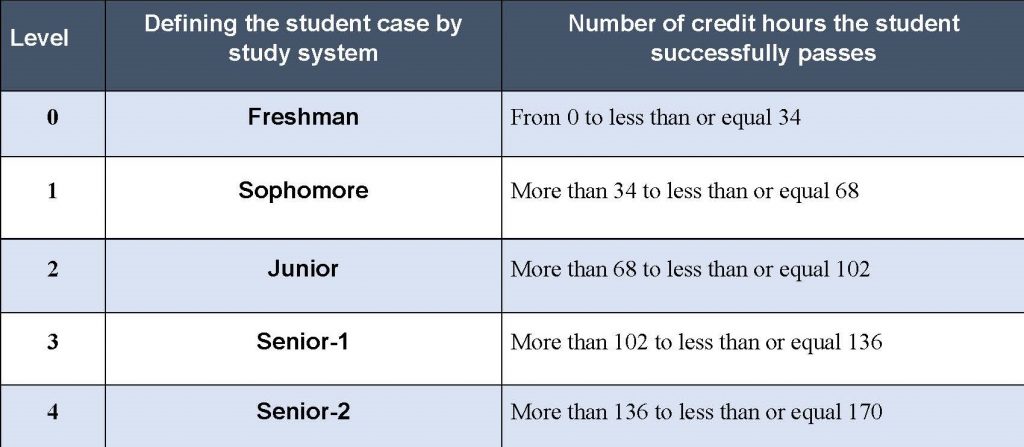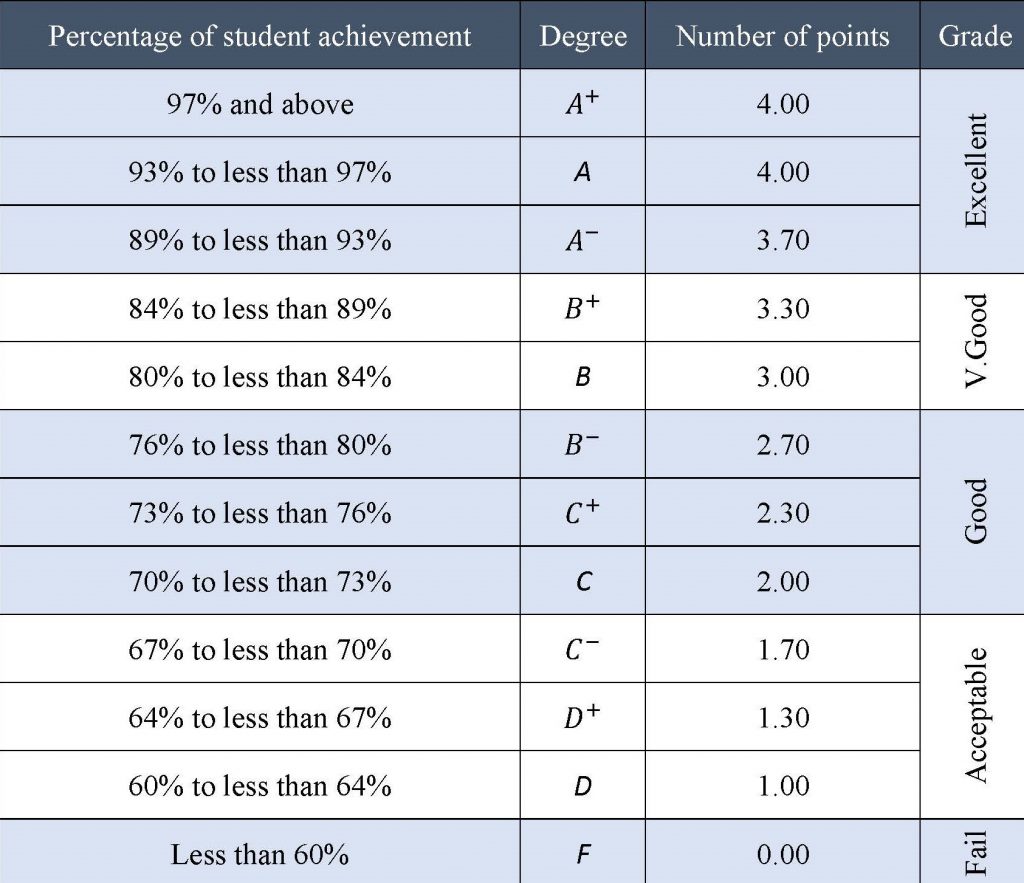Academic Programs
System of Study
Faculty Admission Terms
- Student must hold a general secondary school certificate or a diploma in mathematics or equivalent of Arab and foreign certificates recognized by the Supreme Council of Universities according to the Ministry of Higher Education.
- Admission of international students who have a certificate equivalent to the Egyptian secondary school and recognized by the Supreme Council of Universities.
- The transfer of students enrolled in one of the faculties of Egyptian or foreign universities or a scientific institute that follows the credit hours-system and is recognized by the Supreme Council of Universities may be accepted provided that the student fulfills the requirements of admission to the Faculty and works for scientific clearance for him and counts the credit hours he studied and succeeded in according to the clearance. Acceptance of the student will occur after the Faculty’s approval.
- In all cases, the terms for admission to the faculty are subject to the provisions of the Law of Organizing Universities No. 49 of 1972 and its executive regulations and all the decisions issued by the Supreme Council of Universities in this regard. Students are only enrolled at the beginning of either of the two main semesters.
Study System and Degree Requirements
-
- Successfully pass equivalent courses of 170 credit hours with a cumulative average of at least 2.00.
-
- Pass in the graduation project.
- The courses which are evaluated (Pass / Fail) and include in the cumulative GPA as field training courses should be successfully (Pass).
Language of Study
The English language is considered the language of instruction in the faculty except for the general culture courses where teaching may be in Arabic. The exam is conducted in the language in which the course is taught, and the faculty dean may, in special circumstances, permit the student to answer in another language after taking the opinion of the student’s academic advisor.
Duration of Study and Academic Semesters
-
- The First main Academic Semester “Fall”: Starts in September and study duration are at least 14 weeks.
-
- The Second main Academic Semester “Spring”: Starts in February and study duration is at least 14 weeks.
- Summer Semester: Starts in the late of June and the study duration is at least 7 weeks with the weekly dedicated hours for every course doubled.
Study Levels
The student passes from one level to a higher one according to the following table:

Students’ Specialty Distributions
Students who move from level 0 to level 1 are distributed on the different specialties highlighted in Article 3 of the faculty’s regulation (the academic degrees granted by the faculty) according to the rules annually laid down by the faculty’s council. This is done in light of the available academic facilities in every department as well as according to the rules regulated by the Ministry of Higher Education.
Students’ Course Registrations
The faculty’s council declares the courses registration times before the beginning of each semester and the students have to review their chosen courses with their assigned academic advisors. The academic advisor’s approval of the registration or dropping of a course is a must. Similarly, is the faculty council’s approval of the courses registration for those students who have missed the registration deadline. Thus, registration after the dead line is not allowed with no seemingly pardonable excuse accepted by the faculty’s council. In this case a delay fine, predetermined by the faculty’s council before the study begins, is to be paid.
The Academic Advisor
Every group of 25 students is assigned an academic adviser to help the student comply with the credit hour system, to supervise the student’s study program and to advise and help him in the choice of a semester’s academic courses. The academic advisor also has to monitor the student’s progress and his academic performance as part of following up the academic process. The academic advisor is supported with modern technological means of communication and information technology in registration and withdrawal processes.
Exams
The student passes a final exam at the end of each semester for all courses he registered in time and which are not dropped in time. The student is prevented from attending the exam of all or some courses according to the faculty’s council’s decree after the course’s professor and a recommendation from the department’s council. This is in case of a rate of attendance and practice less than 75% of actual credit hours. The student’s case then is considered as a failure in the courses he is not allowed to attend their exams.
Courses Assessments
The student passes from one level to a higher one according to the following table:

GPA and Points Average Evaluation
The students acquire grades and points in each course according to the following table:
- If the student has a failing grade (F) in one of the courses, (she or he) has to re-register the study and Exam of that course again. The maximum GPA for those courses calculated as (B+), As well as all student obtained estimates have to be mentioned within the academic report.
- All course points that the student has obtained are calculated in standard units called credit hours multiplied by the points which the student has obtained according to the Course Assessments table.
- Grade Point Average (GPA): It is the sum of points that the student gets each semester divided on the total hours that the student passes each semester.

- Cumulative GPA (CGPA): It is the sum of all courses scores that the student gets within all semesters divided on the total hours that the student passes within all semester.

- Transferred students should present detailed course specifications with the university seal for every passed syllabus.
- The cumulative rate (CGPA) of students transferred to a credit hours program is calculated according to courses which student’s studied under HUE or the from the transferred university. In all cases, An equivalent between the previous courses and alternative ones is set to be calculated within the requirements of obtaining the grade including counting them in the calculation of the cumulative rate (CGPA) of the student.

welcome everybody who participates in building a future for our own country to help it take a considerably distinctive place among nations.


